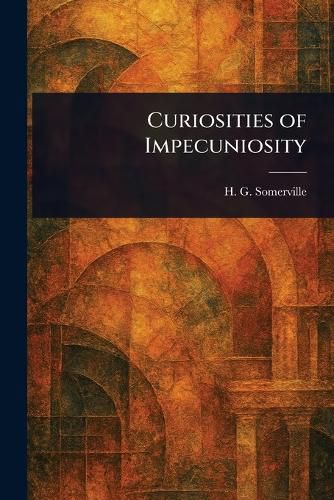Readings Newsletter
Become a Readings Member to make your shopping experience even easier.
Sign in or sign up for free!
You’re not far away from qualifying for FREE standard shipping within Australia
You’ve qualified for FREE standard shipping within Australia
The cart is loading…






This title is printed to order. This book may have been self-published. If so, we cannot guarantee the quality of the content. In the main most books will have gone through the editing process however some may not. We therefore suggest that you be aware of this before ordering this book. If in doubt check either the author or publisher’s details as we are unable to accept any returns unless they are faulty. Please contact us if you have any questions.
"Curiosities of Impecuniosity" by H. G. Somerville offers a compelling glimpse into the financial difficulties faced by poor people in Great Britain. This historical work, categorized under Social Sciences, delves into the subject of poverty, providing anecdotes and observations relevant to the study of economic hardship.
Drawing from biography and social science, Somerville presents a collection of "curiosities" - unusual or interesting cases related to impecuniosity, or the state of being poor. Readers interested in personal finance and the historical context of poverty will find this a valuable resource.
This meticulously prepared edition allows a new audience to explore the timeless and important subject of economic struggle through the lens of a bygone era. "Curiosities of Impecuniosity" provides insight and context that remains relevant for anyone seeking to understand the challenges of poverty.
This work has been selected by scholars as being culturally important, and is part of the knowledge base of civilization as we know it.
This work is in the public domain in the United States of America, and possibly other nations. Within the United States, you may freely copy and distribute this work, as no entity (individual or corporate) has a copyright on the body of the work.
Scholars believe, and we concur, that this work is important enough to be preserved, reproduced, and made generally available to the public. We appreciate your support of the preservation process, and thank you for being an important part of keeping this knowledge alive and relevant.
$9.00 standard shipping within Australia
FREE standard shipping within Australia for orders over $100.00
Express & International shipping calculated at checkout
This title is printed to order. This book may have been self-published. If so, we cannot guarantee the quality of the content. In the main most books will have gone through the editing process however some may not. We therefore suggest that you be aware of this before ordering this book. If in doubt check either the author or publisher’s details as we are unable to accept any returns unless they are faulty. Please contact us if you have any questions.
"Curiosities of Impecuniosity" by H. G. Somerville offers a compelling glimpse into the financial difficulties faced by poor people in Great Britain. This historical work, categorized under Social Sciences, delves into the subject of poverty, providing anecdotes and observations relevant to the study of economic hardship.
Drawing from biography and social science, Somerville presents a collection of "curiosities" - unusual or interesting cases related to impecuniosity, or the state of being poor. Readers interested in personal finance and the historical context of poverty will find this a valuable resource.
This meticulously prepared edition allows a new audience to explore the timeless and important subject of economic struggle through the lens of a bygone era. "Curiosities of Impecuniosity" provides insight and context that remains relevant for anyone seeking to understand the challenges of poverty.
This work has been selected by scholars as being culturally important, and is part of the knowledge base of civilization as we know it.
This work is in the public domain in the United States of America, and possibly other nations. Within the United States, you may freely copy and distribute this work, as no entity (individual or corporate) has a copyright on the body of the work.
Scholars believe, and we concur, that this work is important enough to be preserved, reproduced, and made generally available to the public. We appreciate your support of the preservation process, and thank you for being an important part of keeping this knowledge alive and relevant.